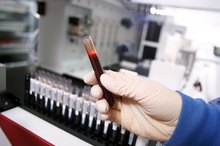High Protein Is a Sign of What?
Protein is an essential component of the body's growth and repair system. It is also required for immunity from disease. A normal protein level is approximately 6.0 to 8.3 gm/dL, according to MedlinePlus. While dietary protein contributes to the protein in your body, simply eating a high protein diet will not cause an elevated level of protein in the blood. There are several medical conditions that lead to high blood protein, known medically as hyperproteinemia.
Infection
Viruses such as hepatitis B and hepatitis C may cause elevated blood protein. Similarly, human immunodeficiency virus, or HIV, can also lead to hyperproteinemia. Treatment of the underlying infection may bring the protein level toward the normal range. Individuals with hepatitis or HIV should eat a healthy diet, avoid substances that harm the liver such as alcohol, maintain an activity level as recommended by their physician and practice effective stress management techniques.
Medication Use
What Does High Protein in Your Blood Mean?
Learn More
Some drugs cause an elevated protein level, specifically insulin, progesterone, growth hormone and steroids. If your protein level is elevated due to medication intake, your physician may determine that the elevated protein level is harmless and temporary.
Chronic Inflammation
Chronic inflammation can be reflected by a high blood protein level. This can occur if you don't get proper treatment for an injury, have an abscess or infection you aren't aware of or have a chronic condition that causes an inflammatory response. Treatment of the source of the inflammation often brings the protein level back to a normal range.
Blood Disorder
What May Cause Too Much Protein in Blood?
Learn More
Multiple myeloma, a type of blood-related cancer that affects the bones, causes an elevated protein level. If this is suspected, your physician will likely order further testing. Amyloidosis is a condition in which your body produces abnormal proteins that end up deposited in your organs or tissues; it creates an abnormally high blood protein level. Waldenstrom's disease is a rare type of cancer manifested by overproduction of a particular protein. Protein levels may remain elevated despite treatment of these blood disorders.
Dehydration
Occasionally, an elevated protein level may be due to dehydration. This typically occurs due to poor oral hydration or significant vomiting, diarrhea or perspiration. The elderly and small children are at increased risk of becoming dehydrated. Treatment with intravenous fluids should restore protein levels to normal. Milder cases may resolve with increased fluid intake for a few days.
Related Articles
References
Writer Bio
J. Lucy Boyd, RN, BSN has written several nonfiction books including "The Complete Guide to Healthy Cooking and Nutrition for College Students." She is frequently called upon to provide career guidance to medical professionals and advice to parents of children with challenges. She also loves teaching others to cook for their families.









